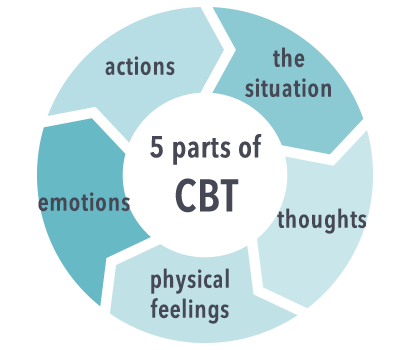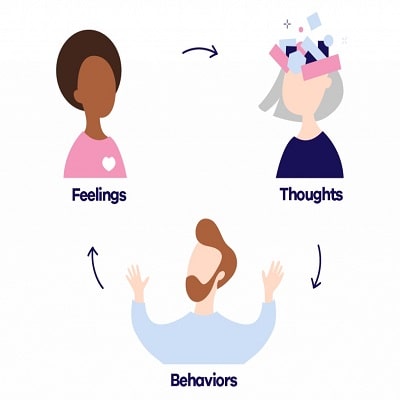Negative thoughts can overwhelm your minds with dysfunctional emotions like stress or fear of the future. Not only can "negative affect," or lousy mood cause you to view things in a distorted manner, but it can also be contagious, i.e., it causes others to treat you less amicably, creating a realm of perpetual negativity around you and everyone you encounter.
In certain situations, stress levels start to intensify because of various reasons. Under conditions of traumatic incidents or severe crises, stress levels can get worse. As a result, symptoms such as excessive worry, rapid heartbeat, churning stomach, etc. can begin to interfere with your overall well-being and cause you to turn to dysfunctional behaviors.

It is easy to get trapped in the habit of thinking negatively and become stressed in specific situations. Therefore, replacing those thought processes to a more pleasant experience is the goal of Cognitive Behavior Therapy (CBT).
Many people have found this form or therapy extremely beneficial in managing stress effectively within a dozen sessions.
Cognitive Behavior Therapy is efficient in treating many issues such as anxiety disorders, depression, and even severe stress. Whether the stress contributes to mental health disorders such as panic, anxiety, or is just creating unpleasant experiences for us that interfere with a systematic lifestyle, CBT can be a very effective therapy model.
What is Cognitive Behavior Therapy?
Cognitive Behavior Therapy(CBT), is a short-term therapeutic model that helps individuals discover new behavioral techniques by changing their thought processes. CBT helps to reduce stress, cope with complicated relationships, deal with grief, and confront many other common life challenges. CBT works on your thought patterns, the way you interpret events in life, and addresses your behaviors and, ultimately, your emotions. Studies have shown that it is useful in many situations. More specifically, CBT is a problem-specific, goal-oriented approach that requires complete participation to succeed. It addresses everyday challenges, feelings, and activities. It is also time-limited, which means a person will know when the therapy will end and have a clear idea of its results. Often, a course will consist of 20 one-to-one sessions, but this is not always the case. It can also consist of either individual or group sessions.
CBT is a collaborative treatment, requiring both the individual and therapist to work together. According to the American Psychological Association (APA), by undergoing CBT, the person eventually learns to become their therapist.
Cognitive Behavior Therapy (CBT)can provide a new perspective on your experiences, enabling you to regain strength and control of your mind and reduce the severe physiological and emotional symptoms. You will also learn effective strategies for dealing with stressful situations at ease.
Benefits of Cognitive Behavior Therapy
Cognitive Behavior Therapy for stress enables you to analyze how certain thinking and behavior patterns can increase stress levels, thereby helping you reduce such occurrences. It also provides you with specific skill sets to identify triggering events, develop new thinking, and use a mindful approach to deal with stressful situations more effectively.

Conclusion
Cognitive Behavior Therapy is a form of psychotherapy where a person learns to modify their automatic thoughts, and compare them with reality with evidence. This can have a significant effect on the patient's behavior and mood.
CBT helps people with many problems, ranging from stress to chronic depression. The therapist and patient can work together to address goals and ensure positive results. However, the individual must be an active participant to benefit.
Anyone considering Cognitive Behavior Therapy for themselves or their close ones must consult a trained CBT professional. At times, treatments can be costly, but self-help therapies are available. However, if your symptoms get out of hand and start to interfere with your daily living, it's advisable to consult a professional therapist immediately. In case you are wondering where to start, Swasth has developed a feature-rich solution named CBT Companion for augmenting the experience of evidence-based therapy sessions, at ease. You can now engage better with your therapist using this robust Behavioral Health Platform.




